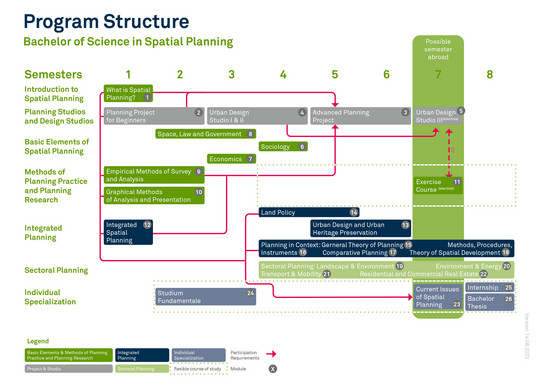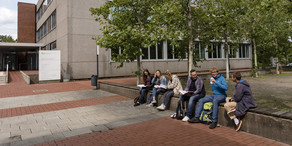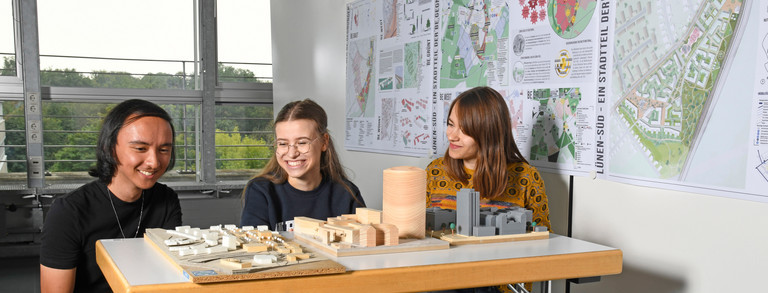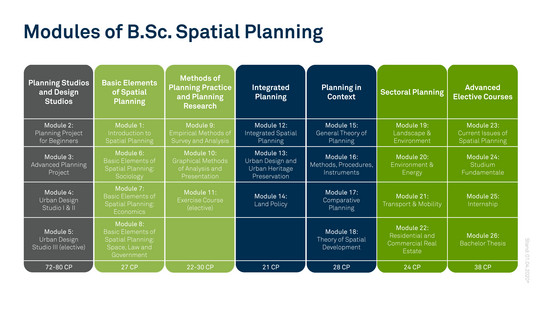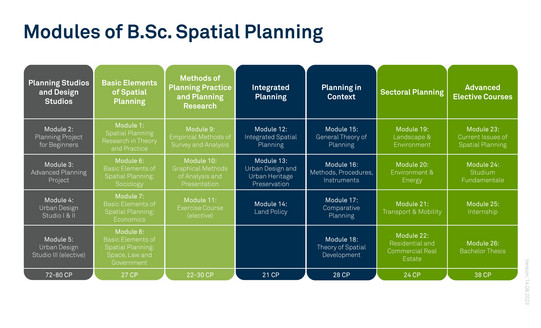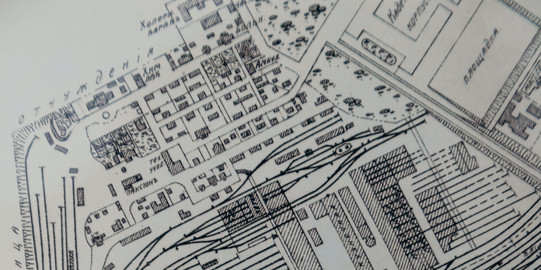Program Structure & Content
The bachelor's degree program at the Department of Spatial Planning is structured as a full-time program and has a standard duration of eight semesters. It is completed with the conferral of a Bachelor of Science (B.Sc.) degree, qualifies for an occupation as a spatial planner and enables entry into the list of urban planners of the NRW Chamber of Architects. After successful completion of the Bachelor's program, students can enroll in the two-semester Master's program.
Study structure and credit points
The study program is divided into 26 modules, which comprise courses with interrelated content. According to the BSc Exam Regulations, a total of 240 credit points (Credit Points (CP) = Leistungspunkte (LP) in German language) must be acquired through the successful completion of the individual modules. Thus, between 27 (5th semester) and 33 (2nd semester) credit points are to be acquired per semester. The calculation of the resulting workload is based on 25-30 working hours per credit point, so that an average of 900 working hours per semester is assumed.
Module structure
This section provides an overview of the module structure of the BSc program. Detailed information on the individual modules and the respective examinations can be found in the module handbook (in German only). The current course, project and seminar topics and descriptions assigned to the modules can also be viewed on the university teaching, study and research, or LSF ("lehre, studium, forschung") portal. Even without logging in, these can be viewed under Events > Course Catalog > Room Scheduling.
More detailed information can be found under Course of Studies and Teaching Content.
Course of study
In the first two semesters, students will take Module 1 (Introduction to Spatial Planning), Module 2 (Planning Project for Beginners), Module 9 (Empirical Methods of Survey and Analysis), Module 12 (Integrated Spatial Planning) and the first sub-module of Module 10 (Graphical Methods of Analysis and Presentation). It is also recommended that Module 8 (Space, Law and Government) be taken at the beginning of Semester 2 and completed by the end of Semester 3.
Completion of modules 1, 2, 8, 9, and 12 is a prerequisite for completion of the integrating spatial planning modules (modules 14, 15, 16, 17, 18) and module 23 (Current Issues of Spatial Planning). Module 4 (Urban Design Studio I & II) can be taken at the beginning of the 3rd semester, which extends over two semesters. Modules 6 (Sociology) and 7 (Economics) each last one semester.
From the 4th semester on, the course of study and the completion of modules 11 and 14 to 25 can be flexibly arranged. However, it is recommended that modules 3 (Advanced Planning Project) and, if applicable, 5 (Urban Design Studio III *elective) be taken at the times suggested in the diagram.
The bachelor thesis should be written in the 7th or 8th semester. It should be taken into account that the bachelor thesis does not have to be the last examination. However, modules 1, 2, 3, 4, 8, 9 and 12 must be completed successfully as prerequisites for the bachelor thesis. In the 7th or 8th semester - depending on personal interests - a semester abroad can be planned.
Details on the German-language program can be found on the German pages of our homepage at https://raumplanung.tu-dortmund.de/studieninteressierte/bachelor-raumplanung/studienstruktur-studieninhalte/.
